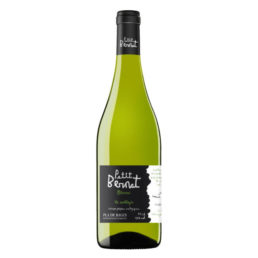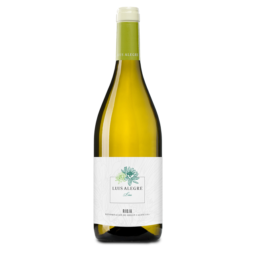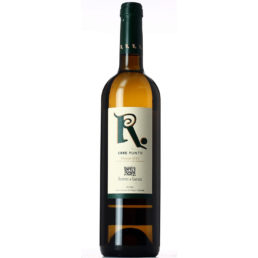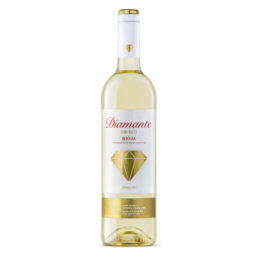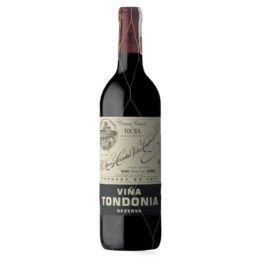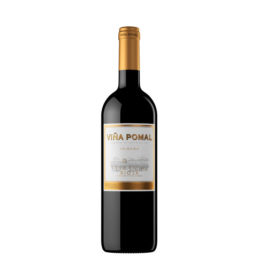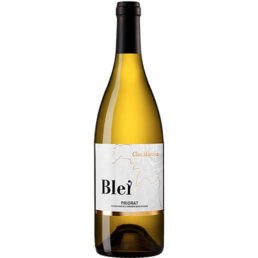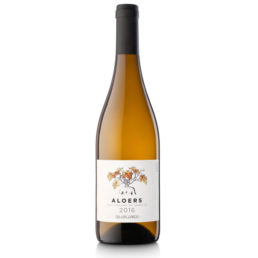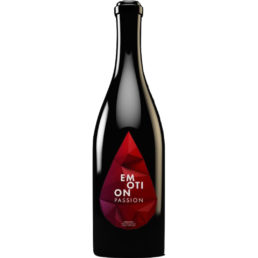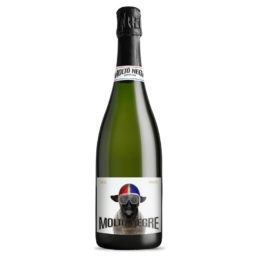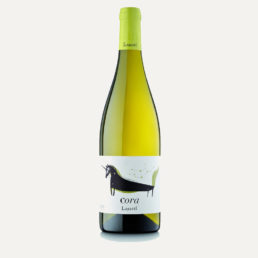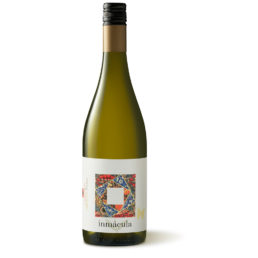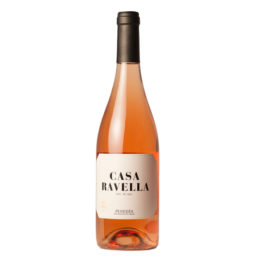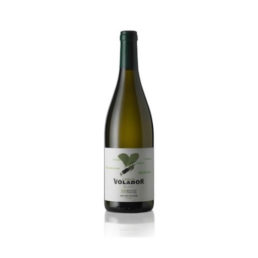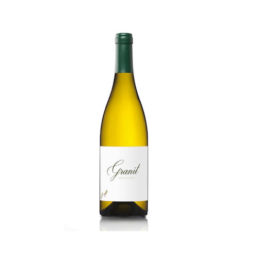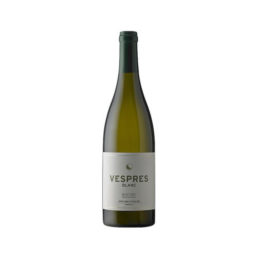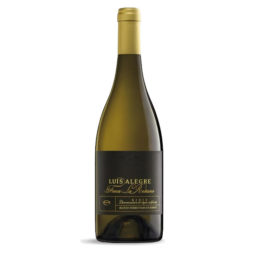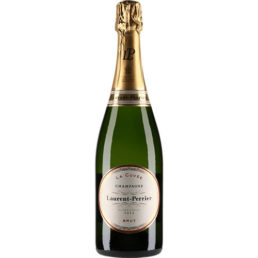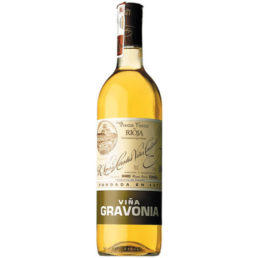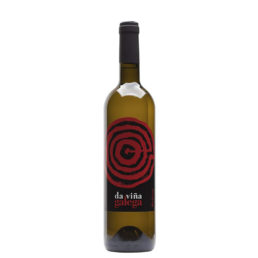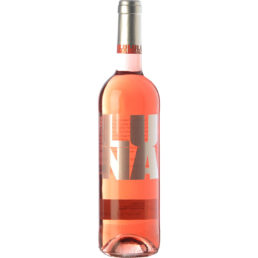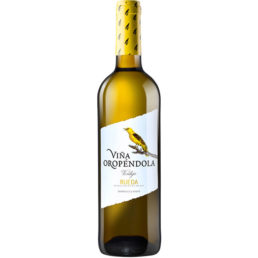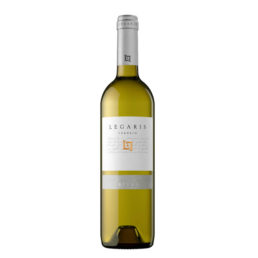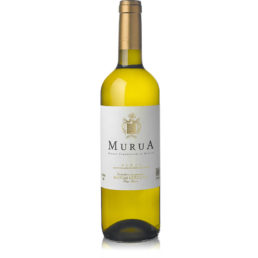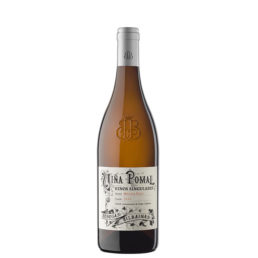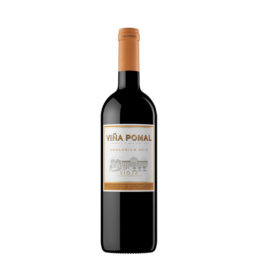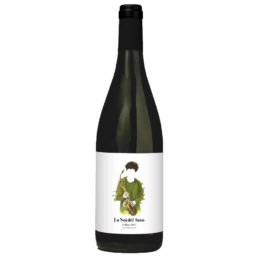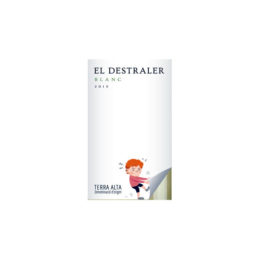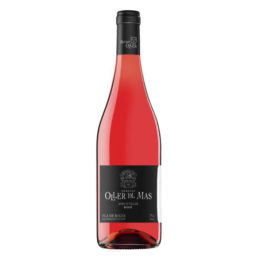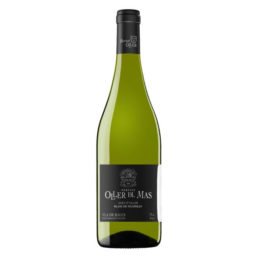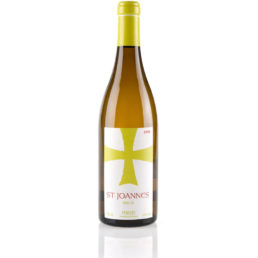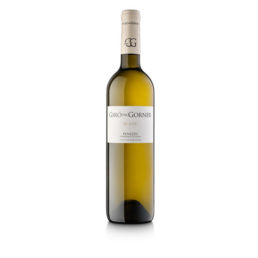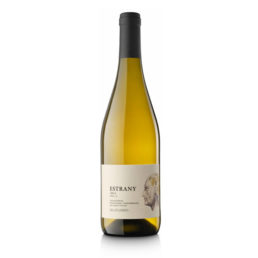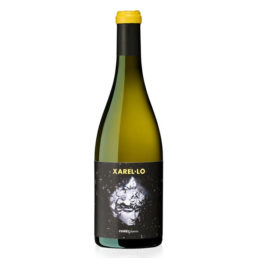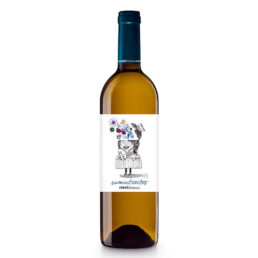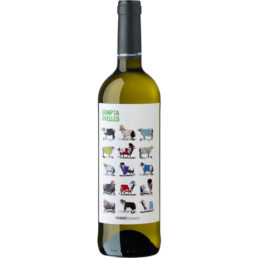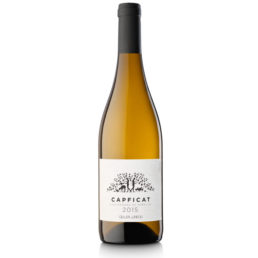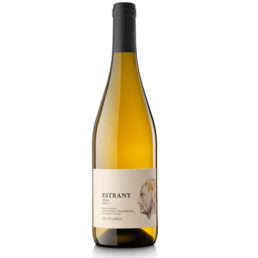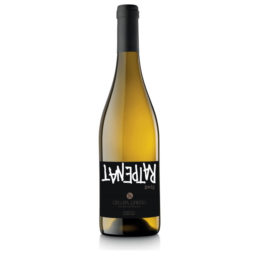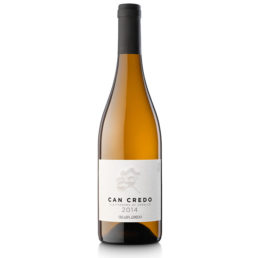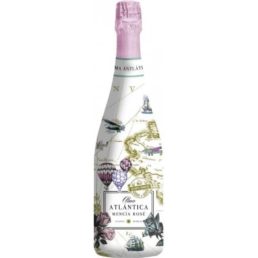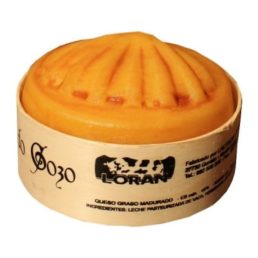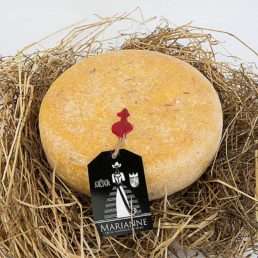VINIFICATION Pre-maceration in cold during 24 hours. Pressing to racking to a tub where it is kept other 24h. Fermentation in new French oak barrels (Q. Petrea) of 300 liters, fine grain and medium toast light. Parenting 6 months with lees and "battonage" journal. Stabilization in cold, the natural way (seasonal), not induced. Bottled: 1 year in the bottle.
AWARDS GOLD medal INTERNATIONAL WINE CHALLENGE 2016.Fish
-
White wine – Petit Bernat 2018
White Wine Petit Bernat 2018Production: 24.267 bottles Wine:Pressing, clarification, fermentation and rearing on mothers. Cold maceration before pressing. Alcoholic fermentation of 21 days at 16ºC.Oller del Mas is part of the Denomination of Origin Pla de Bages, a privileged area, surrounded by mountains like Montserrat, or the Parc Natural de Sant Llorenç del Munt i l'obac. -
Luis Alegre white wine Viura About Lías 2018
Selection of grapes of viura from plots of vineyards of between 40 and 60 years old.Gentle pressing, to avoid breakage of seeds.Fermentation with controlled temperature (7-9 days).Subsequent work on the lees (inactive yeasts): soft results on these to break their cell walls to let flow the wine sugars and proteins that contain.Goal: generate a wine that is more structured and complex aromatically.Clarification and filtration lightweight. -
Erre Punto Blanco Wine
Erre Punto white wine
Eight months of aging. Fermented and aged in new French oak barrels with a meticulous and precise battonage that takes place only when the lees have been deposited at the bottom of the barrel. As a result, in Remírez de Ganuza they deliver a spectacular white with a perfect glyceric point that does not lose an iota of freshness. 91 Parker points. -
Semi-dry Bordon White Diamond Wine
White Diamond Bordon Semi dryElaborationThe grape clusters are received in a stainless steel hopper to be later destemmed (berry and broom separation) and then ground their berries. Contact with grape skin, pulp, Pips and wort are produced in stainless steel tanks during 14 hours approximately at an average temperature of 10 ºC. After this time, the must is separated from the solid parts and ferments separately at an average temperature of 16 ºC. After part of the fermentation, it is paralyzed by cold systems in order to maintain the natural sugars that give this wine one of its peculiarities.Technical Data Sheet90% Viura and 10% Malvasía Straw yellow with golden tones Notes of ripe fruit Smooth and unctuous -
Viña Tondonia Reserva Red 2008
Characteristics of the harvest: Year rated as EXCELLENT by the Rioja Regulatory Council. The absence of frost in spring and the good environmental conditions that were conducive to the fertilization and the ripening of the grapes and offset the harmful effects of pests that attack the buds at the time of bud break and bud burst–, made to produce an abundant harvest. Despite suffering a summer unstable and stormy, this large quantity of harvest achieved high levels of quality thanks to the optimal climatic conditions of a month of October, bright and fresh, that enabled us to carry out the work of vintage and convenient way to staggered, encubando each of the varieties in their point of seasoning, mature and balanced without putting in danger at any time, the perfect sanitary state of the grapes. The work of grape harvest began on the Viña tondonia estate of the day 11 October.Aging in oak barrels: 6 years old, subject to 2 rackings per year. Clarified with whites of fresh eggs.Limited production: 35.000 bottles.Pairing: cooked fish, fried or grilled, spicy. Seafood cooked a la plancha. White meats with sauces consistent. -
Red wine – Viña Pomal Centenario Crianza Magnum
Viña Pomal Centenario Crianza is a wine special, commemorative of the centenary of the brand. A perfect balance between the classic nature of a red crianza from Rioja, and a presence of fruit more noticeable.DEVELOPMENT (VINIFICATION)Viña Pomal Centenario Crianza is characterized by a vinification traditional: after de-stemming and crushing takes place the alcoholic fermentation. Maceration total is two weeks, looking for a structure of wines, soft, pleasant and with great intensity of fruit. Twelve months in american oak barrels (15% new) we bring the complexity and the maturity necessary to complete the expression of this red wine Reserve.VINEYARD (VITICULTURE)The finca Viña Pomal is made by 90 hectares of vineyards. Nestled in the municipality of Haro and less than 2 kilometres of the winery, located in one of the most beautiful areas of the city; through them we can enjoy the passage of the river Ebro through the conchas of Haro.Combine on our farm D. O. Ca. Rioja the different ecosystems in function of the variability of the soil and the sun exposure, what that translates to in a comprehensive selection of homogeneous areas. The viticulture is applied arises from a mixture between traditional rioja and the precision, resulting in a growing commitment to innovation in order to protect the nature, always under the parameters of maximum quality. The work of our own vineyards, we add a demanding grape selection of our suppliers of Rioja Alta.PAIRINGViña Pomal Centenario Crianza harmonizes perfectly with light dishes such as rice dishes, cheeses, pates, stews, vegetables, fish... in addition to the typical dishes that combine traditionally with the aged red wines. -
White wine Mas d'en Blei – Clos Martina Magnum
PRODUCTION 4.000 bottles.VITICULTURE Grapes are produced only of the finca Mas d'en Blei. Vineyards on terraces of slate (licorella). Vintage hand. Selection in table. Development separated by varieties. -
White wine Celler Credo – Aloers Magnum
It was called ‘Aloers’ to the farmers of the Middle Ages who were the owners of the land that they cultivated. The aloers were free of any provision or census.The white wine Aloers come exclusively from the family vineyards of the Pedra Blanca, located in the comarca of the Alt Penedès (Barcelona) and cultivated following the principles of organic farming and biodynamic.We work the vineyards, leaving to grow a ground cover spontaneous, important to fluff up the soil and regulate the retention and the drainage of water in a rainfed cropping as we practice.This cover is essential to promote biodiversity and balance in the ecosystem of the vineyard, where we apply treatments with medicinal plants (phytotherapy) to control the presence of fungus and strengthen the strains of a totally natural way.The grape harvest at Celler Credo is carried out by hand to ensure the excellent quality of the clusters.Aloers provides the freshest and most genuine expression of the Mediterranean variety Xarel lo grown in calcareous soils.. It is a wine of great vitality and a long journey in a bottle.Produced from the maceration for a few hours with the stalks and to work with the lees during the time of approximately a month and a half. The fermentation takes place with yeast own from the vineyards of Celler Credo.Aloers look for the maximum expression of the terroir and, therefore, you can present natural sediments the result of a minimal intervention. The vinification and the bottling are done in our property. -
Red wine Bodegas Emotion – Emotion Passion
Limited production 2.000 bottles.ElaborationWine Passion is created in a garage and has been developed completely handmade. All the movements have been made in the winery by gravity and feeling the grapes, by being walked on, not to suffer anything to the wine, and keep all its aromas to be bottled. It is elaborated with grapes of the variety Tempranillo, from vineyards in Baños de Ebro (Álava), adjacent to Elciego (in the foothills of the Sierra de Cantabria) and also one small Laguardia.The harvest was carried out manually in boxes of grape-12kg, by stacking the clusters in only two rows, not to alter the natural conditions of the grape. Has previously been pruned to a result of 2 the 3 clusters per vine vine.In the cellar have been made bazuqueos daily, and a return to daily. After finishing the development, with the best of the best, only been out a limited production of 2.000 bottles.There have been two selection tables for inspect good grape, which was in his right point of maturation. It has been fermented for 23 days 24-25 ° C of temperature in stainless steel tanks and part in barrels/tino 1,000 l.Malolactic fermentation in barrel: The barrel aging has been a year in barrels 500 and 225 liters. You have to 13.9 º of alcohol.PairingEmotion Passion could be the ideal companion for events and ceremonies or special meetings. Meat, Fish, pasta...Michelin StarsYou can find this wine in some restaurants with Michelin Stars. Among others, in the following restaurants:- *** Arzak. San Sebastian (Gipuzkoa)
- *** Azurmendi. Larrabetzu (Bizkaia)
- *** Martin Berasategui. Lasarte-Oria. (Gipuzkoa)
- *** Akelarre Pedro Subijana. San Sebastian (Gipuzkoa)
- *** Mugaritz. Renteria (Gipuzkoa)
- ** "El Faro del Puerto". The Port of Santa Maria (Cádiz)
- *** Etxebarri. Atxondo (Bizkaia)
- ** Echaurren. Ezcaray (Rioja)
- * Andra Mari. Galdakao. (BIzkaia)
- * Etxanobe. (Bilbao)
- * Albora. (Madrid)
- ** Ramon Freixá. (Madrid)
- ** Boroa (Amorebieta. (Bizkaia)
- ** Nerua Guggenheim. (Bilbao) Elcano (Getaria)
- ** Lasarte of Berasategi. (BCN)
- * Aizian. (Bilbao)
- * El Bohio. (Toledo)
- * La Solana. Ampuero (Cantabria)
- * Cenador de Amos. (Villaverde de Pontones (Cantabria)
- ** AbaC Jordi Cruz. (BCN)
- * Can Bosch. Cambrils (Tarragona)
- * Tatau Bistro. Huesca (Huesca)
- * Hoffman (BCN)
- * Arbore da Veira (A Coruña)
-
Cava Red House – Black sheep
Villafranca del Penedes, cradle of cava, Trepat grow grapes that give rise to our cava. Loamy texture soils, in some cases somewhat chalky, with some clay content.Upon receipt of the table in the winery temperature thereof is lowered to 5 ° C for later making pressing. Use only the flower must first pressed. Fermentation about 14 ° C 25 days to preserve the maximum power of the aromatic variety.The bottle rests for a minimum of nine months in rhyme. After the disgorgement to remove sediment is added to the liquor issue.This is a cava extra brut, with only 3,5 grams per liter of sugar. And slightly pale ink asalmonado fruit variety Trepat. floral and fruity nose, with aromas of small berries. The palate surprises until the last bubble, with one step up, tasty, creamy, where blackcurrant flavors are emphasized, blackberry and pralines.Limited production 34.623 bottles. -
White wine, Loxarel – Cora (ecological)
Elaboration
Viticulture, organic and biodynamics.From the vineyards themselves are located in the Alt Penedès, at an altitude of 500m above sea level. The Xarel lo comes from our farm in Vilobí del Penedès, in what is known as the Xarel·lo Triangle. Maceration with the grape skin during 6 hours, with carbonic snow, in order to respect the aromas and prevent oxidation.Pairing
Ideal to accompany appetizers, was, oysters, shrimp cocktail, fish and rice. In general, it combines very well with all mediterranean cuisine. -
White wine Tandem – Inmácula
Inmácula In Latin, without stain. A different white fermented in French oak and kept on its fine lees for three months to gain texture and complexity.WinemakingAfter you remove the stems, the grapes macerated whole for a few hours in the tank.Sangramos the first wort and filled the barrels 300 liter French oak where it ferments at a temperature of 17-18 ºC Once the fermentation terminated, we begin with the bâtonnage journal, the process in which we mix the wine with the lees in order to get more volume in the mouth.Pressharvest 2013 - 90 points Wine&Spirits magazine, 90 points STEPHEN TANZER, 90 points ROBERT PARKER harvest 2014 - 90 points STEPHEN TANZER91 points PEÑIN Guide -
Rosé wine- Casa Ravella Rosado (ecological)
SOURCEAlt Penedès. Penedès denomination of Origin. Own vineyards of our farm House Ravella ('ordal).DEVELOPMENTOnly crops own. Manual harvest with selection of the grapes in own vineyard.De-stemming, total.After a short maceration, fermented in stainless steel tanks with temperature control. -
White wine Josep Grau – L’ Efecte Flying Blanc 2019
Viticulture and VineyardsThe grapes for this wine comes from an estate of Marca (The Priorat) with clayey soils and decomposed granite. Vines 5 years of age. Organic cultivation. The work is carried out 100% manually.WinemakingThe grapes are harvest and pressed slowly in a pneumatic press for a period of 6 hours to perform a extraction slow of all the aromatic potential of the variety. Ferments for 15 days in stainless steel tanks, where it will remain after 5 more months to finish maturing. -
White wine Josep Grau – Granit 2018
Viticulture and VineyardsVineyard nestled in the terraces at Starting I Eat, at a height of 450 metres and very exposed to the wind coming from the sea. Soil 100% decomposed granite, with very little water retention and are rich in minerals. Organic cultivation. All the work is carried out manually. Vintage in boxes 10 kg.WinemakingPressed during 7 hours. Fermentation and aging in foudres of oak, austrian and German 2.000 litre capacity. Aging during 9 months with the lees. -
White wine Josep Grau – Vespres white
THE VINEYARD AND VITICULTURE:Farm 6 has. in the municipality of Marca (The Priorat) of 15 years of age, in soils of decomposed granite. Organic cultivation. All the work is carried out 100% manually. Vintage in boxes 10 Kg.VINIFICATION:Indigenous yeast. Pressing 6 hours and spontaneous fermentation foudres of 2.000 litre capacity. Parenting during 5 months on its lees in the same foudre fermentation. -
White wine Luis Alegre – Finca La Reñana
GREAT WINES FROM SMALL ESTATESElaborated with grapes from Vineyards of Finca La Reñana, of 85 years old, located in the foothills of the Sierra Cantabria, to 650 m. with low returns (3.500 kg/ha) that allows slow ripening and slow.Vineyard Finca La Reñana, of 85 years old, located in the foothills of the Sierra Cantabria, to 650 m. with low returns (3.500 kg/ha) that allows slow ripening and slow.Vintage manual boxes 15 kg.Selection table.fermented barrels 7-8 months on its own fine lees.Battonage newspapers to extract proteins and sugars, and that they flow the wine.Special oak forest atypical from the Bertranges.Acknowledgements Peñín: 91
Peñín: 91 Tim Atkin 94
Tim Atkin 94 Wine Advocate/Parker 91
Wine Advocate/Parker 91 Stephen Tanzer 94
Stephen Tanzer 94 -
Champagne Brut Laurent Perrier -Cuvée
The wine comes from the grape juice more pure and only Laurent-Perrier can develop 'Cuvée', a champagne of great finesse and a beautiful freshness obtained after a long process of ageing in our cellars.The style and the personality of Laurent-Perrier is defined by its high proportion of Chardonnay. Purity, freshness and elegance - essential features, expressed in this champagne - they are a good introduction to the spirit of the house.By opting to merge its Brut champagne with a majority of Chardonnay, the grape variety more rare in the Champagne region, Laurent-Perrier expressed his difference and he said the style of freshness, lightness and elegance of the "Home".After 15 years of extensive work on the quality of the offer, the constant progress in terms of the development of the wine and the greater mastery of the art of the mix, Laurent-Perrier presents The Cuvée.Mix and wine making To the mixture, only used the musts of the cuvée, so that only the 80% the grape juice is extracted from the pressed.Varietal grape:The majority of Chardonnay, most of the 50%.Pinot Noir, most of the 30%.Rounded off with Meunier, between 10 and 20%.+ Reserve wines up to a 20-30% to ensure a perfect consistency in the style.Crus: the mix of Laurent-Perrier's Cuvée is made of more than 100 crus * selected by Laurent-Perrier.The Cuvée benefits from the aging ideal in the cellar. Its balance and freshness are enhanced by a light dosage.* These quantitative data may vary and are given for illustrative purposes.Pairing This wine is fresh and pure is perfect for an aperitif. Its notes of white fruits and citrus fruits and its considerable balance underpinned by a subtle effervescence, turn it into a ideal accompaniment to poultry and the best fish. -
Viña Gravonia Crianza 2012
Characteristics of the harvest: Year officially qualified as VERY GOOD. Year that goes by without incidents of weather severe, in the absence of spring frosts, but marked by abundant spring rainfall and post-harvest, however a summer of benign and drier favored the ripening and health of the grapes which resulted in the obtaining of a harvest it is not very abundant but of similar quality to that of the previous year. The weather was exceptionally favourable during the whole of the final phase of the vegetative cycle, something that is always decisive for the quality of the harvest. Our vineyards enjoyed optimal conditions for the health status of the fruit was virtually perfect, and the maturity to evolve with parameters, balanced color, acidity, alcoholic strength, etc., what that has allowed us to obtain a harvest of high quality and something lower on your final volume to the previous. The work of collection of the grapes began on the day 6 October in “Viña Gravonia” with the white grape varieties, the day 9 October in “Viña tondonia estate” with the varieties and finalized the 30 October after harvest “Viña Cubillas” and “Viña Bosconia”.Aging in barrel: 4 years old, subject to 2 rackings per year. Clarified with whites of fresh eggs.Limited production: 13.000 bottles.Pairing: cooked fish, fried or grilled, spicy. Seafood cooked a la plancha. White meats with sauces consistent. Combines well with pasta. -
Galician white wine Albariño Daviña
Young white wine cellar Adegas Valdes fresh with fruity and citrus. -
Rosé wine Caesar Prince – Clarete de Luna
Have that, before you begin the harvest, the vineyards were visited in the night by some neighbors friends others. In times when the need was the greatest company of the peoples, it was called “Clarete de Luna” the wine, which made those who did not have vineyards own, so apañaban with the other, yes, discreetly. Only the moon was witness of that feat.They were times in which the wine was important complement to the food, the claret was accompanied by the site and lunch, happy the sad and stews and help you to take better penalties. This wine is a tribute to all those who once needed and that today we enjoy.This is a wine made with Tempranillo, mainly, and white varieties such as Verdejo or Albillo. Cool, fun, sweet to all the public... and all the days. -
White wine Viña Oropendola Verdejo
Comes from a selection of vineyards of the Verdejo variety arranged in vase and with an age between 40 and 120 years old. The vineyards are located on soils of alluvial terraces and rocky near the margin of the river Duero.Foster
3 months in tank on lees with Batonnages biweekly.
Fermentation
During 21 days at a temperature of 14-16ºc
Time of Maceration
16-20 hours film in cold at 10 ° c
-
White wine Legaris – Legaris Verdejo
With Legaris Verdejo the winery entered in the D. O. Wheel. White wine modern for their taste and aromas, stands out as the perfect combination between the explosion of fruit and the elegance floral. The Verdejo variety provides intense aromas of white fruits and a hint of citrus (lemon). The innovative use of screw cap preserves perfectly the qualities of the wine until the time of consumption.DEVELOPMENT (VINIFICATION)Vintage night mechanical training in the trellis and day manual in vessels. Reception of grapes in the hopper, de-stemming-crushing, maceration in the press for 2-4h and subsequent pressing. Desfangados static and flotation, alcoholic fermentation at low temperature (14 ºC) with selected yeasts.VINEYARD (VITICULTURE)The area of vineyards controlled is 2.100 hectares provided by a 300 suppliers of grape. The largest concentration of vineyards are registered in the municipalities of Wheel, Sawn and Dried in the province of Valladolid and in the boundary zone of the province of Segovia, in the D. O. Wheel. The vineyard is located at an altitude of between 700 and 850 meters above sea level.The soils most characteristic are the “gravel”: soils brown, stony with good aeration and drainage. The traditional training has been the glass, while in recent years all new plantings are done in trellis.PAIRINGLegaris Verdejo is a white wine that harmonizes perfectly with tapas, rice, salads, fish and pasta. -
White wine Murua Fermented in a Barrel
The estate of Murua is composed by 110 hectares of own vineyard. The strains of the autochthonous varieties such as Viura, Malvasía and White Garnacha are between 40 and 80 years of age and are true gems located in the headwaters of the vineyards, cultivated as it was formerly in Elciego and the rest of The Rioja Alavesa.
The add 2016 he presented with a mild winter in terms of temperatures is referred to. The spring was cool and cloudy, delaying the sprouting. Summer came very dry and warm, regaining the time lost in sprouting. The nights were cool, allowing the plant to rest and have a good level of development without suffering. We had exceptional returns due to good weather favorable to obtain a high quality and a good production. The sanitary state was perfect also because of the good weather during the harvest.
Limited production to 7.590 bottles.
VINIFICATION AND AGEINGFollowing a traditional process, the wine was fermented in new barrels of French and american oak for 15 days. Once the fermentation terminated the wine was raised in the same barrels and on their lees during 7 months then moved to the bottle of Murua. -
White wine Bodegas Bilbaínas – Viña Pomal Maturana blanca 2016
Viña Pomal Maturana Blanca part of the collection of single varietal Bodegas Bilbaínas, Viña Pomal Wines Unique. The Maturana Blanca is also known by the name of Ribadavia. It approved its use in the D. O. Ca. Rioja 2007, although it is the variety oldest of which we have written knowledge in Rioja, as cited already in 1622. It is a variety of good fertility, presents a small bunch and berry elliptical, also small in size. It is early in its development, and it is remarkable for its low pH, with a high content of tartaric acid and low in potassium. Presents the disadvantage of high sensitivity to botrytis, so that is exacting in her follow-up.DEVELOPMENT (VINIFICATION)Spontaneous fermentation in american oak casks new. Work of the lees during 3 months. Subsequently raised in French oak for 4 months.VINEYARD (VITICULTURE)Comes from the estate Paceta 14, located in the municipality of Haro, still the plot bordering with the basque Country and Burgos, a few 100 meters. Plot 17 years of age, grafted plants in Ribadabia on 110R, framework 2.6*1.2. It is a farm located in the privileged enclave sheltered from The Shells of Haro. At an altitude of 448 meters and oriented North-South,with a marked Atlantic influence. The morphology of the plot is composed by narrow lines, following the curves of level. Account with a surface of 0,66 hectares of D. O. Ca. Rioja.AWARDS93 POINTS ROBERT PARKER 201892 POINTS TIM ATKIN (UK) - RIOJA REPORT 201891 POINTS JAMES SUCKLING 2018 -
Red wine – Viña Pomal Ecological
The eco-friendly family of Viña Pomal. The responsible management and sustainable each of our plots is a sign of identity that characterizes the vineyards of Bodegas Bilbaínas. Red wine Viña Pomal Green is the ultimate expression of a lockjo focused on the environment.DEVELOPMENT (VINIFICATION)Viña Pomal Ecological is characterized by a vinification traditional: after de-stemming and crushing, takes place the alcoholic fermentation with a duration of two weeks, in which the wine acquires a soft structure, nice and with great intensity of fruit.6 months of ageing in new american oak casks, we provide a complexity and maturity necessary to complete the expression of this red wine.VINEYARD (VITICULTURE)The grapes come from 17 hectares of vineyard certified organic located in Haro. Its cultivation is done with the maximum respect for the environment, using only natural products authorised for organic viticulture.The responsible management and sustainable each of our plots, it is a sign of identity that characterizes the vineyards D. O. Ca. Rioja from Bodegas Bilbaínas. Viña Pomal Green is the ultimate expression of a job-focused environment.PAIRINGViña Pomal Ecological harmonizes perfectly with light dishes such as rice dishes, cheeses, pates, stews, vegetables, fish... -
Red wine – Viña Pomal Centenario Crianza
Viña Pomal Centenario Crianza is a wine special, commemorative of the centenary of the brand. A perfect balance between the classic nature of a red crianza from Rioja, and a presence of fruit more noticeable.DEVELOPMENT (VINIFICATION)Viña Pomal Centenario Crianza is characterized by a vinification traditional: after de-stemming and crushing takes place the alcoholic fermentation. Maceration total is two weeks, looking for a structure of wines, soft, pleasant and with great intensity of fruit. Twelve months in american oak barrels (15% new) we bring the complexity and the maturity necessary to complete the expression of this red wine Reserve.VINEYARD (VITICULTURE)The finca Viña Pomal is made by 90 hectares of vineyards. Nestled in the municipality of Haro and less than 2 kilometres of the winery, located in one of the most beautiful areas of the city; through them we can enjoy the passage of the river Ebro through the conchas of Haro.Combine on our farm D. O. Ca. Rioja the different ecosystems in function of the variability of the soil and the sun exposure, what that translates to in a comprehensive selection of homogeneous areas. The viticulture is applied arises from a mixture between traditional rioja and the precision, resulting in a growing commitment to innovation in order to protect the nature, always under the parameters of maximum quality. The work of our own vineyards, we add a demanding grape selection of our suppliers of Rioja Alta.PAIRINGViña Pomal Centenario Crianza harmonizes perfectly with light dishes such as rice dishes, cheeses, pates, stews, vegetables, fish... in addition to the typical dishes that combine traditionally with the aged red wines. -
White wine Bielsa Ruano – The Noi of the Sax 2019
DEVELOPMENTFermented at a controlled temperature. Preserved during 2 months with the lees. -
White wine Celler Germans Balart – The destraler blanc
DEVELOPMENTDry white wine. Fermentation at a controlled temperature of 18ºC in stainless steel tanks. -
White wine Mas d'en Blei – Clos Martina
PRODUCTION 4.000 bottles.VITICULTURE Grapes are produced only of the finca Mas d'en Blei. Vineyards on terraces of slate (licorella). Vintage hand. Selection in table. Development separated by varieties.VINIFICATION Pre-maceration in cold during 24 hours. Pressing to racking to a tub where it is kept other 24h. Fermentation in new French oak barrels (Q. Petrea) of 300 liters, fine grain and medium toast light. Parenting 6 months with lees and "battonage" journal. Stabilization in cold, the natural way (seasonal), not induced. Bottled: 1 year in the bottle.
AWARDS GOLD medal INTERNATIONAL WINE CHALLENGE 2016. -
Rosé wine – Bernat Oller rosé
Production: 1.577 bottlesWinemaking:Merlot bleeding with three hours of maceration.Picapoll direct pressing, soaked an hour in cold. Fermentation in different reservoirs during 21 days at 16ºC.Four months into parenting mothers total with a return to weekly. -
White wine – Bernat Oller Blanc de Picamolls
Production: 12.133 bottlesWinemaking:Caught by hand. Maceration in cold before pressing. The black grape is vinifica as Blanc de Noirs.The black grape, has done the fermentation and the ageing eggs of concrete for four months. The white grape has made the fermentation and the aging in two different items.Stainless steel tanks. Fermentation of 21 days at 16ºC. Parenting mothers total, during 5 months with stirred weekly. -
White wine Sant Joannes Xarel.what
Elaboration:Manual harvest of the last days of September. Clarification for one night (12h.) to 13ºC. Fermentation in stainless steel tanks at a controlled temperature (15ºC-17ºC). Stirring of lees daily during the winter. Coupage before bottling with wine remained in French oak barrels, corresponding to the previous year (approx. 10%), add elegance feature. -
White wine Giró del Gorner
The wine Blanc Penedès of Turned the Gorner is a classic Penedès. A wine that aims to recover the wines of our ancestors, developed basically with the typical varieties, the Penedès: Macabeu, Xarello and Parellada. There are No more secrets that few vineyards pampered, a few selected grapes, a gentle pressing, time and enjoy it.Elaboration:
Smooth extraction of the flower must. The fermentation has gone by very slowly, between the 15 and 18ºC.
Pairing:Perfect to accompany appetizers, salads, fish and seafood, cheeses and light white meats -
Cino Credo - Estrany white wine
‘Estrany’, that offers something unexplained, and that excites the curiosity. What was strange in the wine of our grandparents?The white wine Estrany comes from the vineyard Serral del Bosc, extremely calcareous soilsand frank texture (balance between arenas, silts and clays). It is a self-owned vineyardlocated in the Alt Penedès region and cultivated following the principles of organic farmingand biodynamics.At Celler Credo, we work the vineyards, leaving to grow a ground cover spontaneous, very important for loosening the soil and regulating the retention and drainage of water in a crop ofdry land like the one we practice. This carpet of vegetation it is essential to promote biodiversity and balance in the ecosystem of the vineyard, where we apply treatments with medicinal plants (phytotherapy) to control the presence of fungus and strengthen the strains of a totally natural way.The grape harvest at Celler Credo is carried out always at hand to ensure the excellent quality of the cluster. Before pressing, the grapes destined to the production of the Estrany passes through the selection table manual.Estrany retrieves a way ancestral to develop, when the wine is maceraba with the skin of the grape. It is a work with the grape skins taken to the limit and that aims to show the Xarel lo variety without concessions and with total frankness., deep and rough elegance. The fermentation takes place with yeast own from the vineyards of Celler Credo.You can present natural sediments the result of a minimal intervention. The vinification and the bottling are done in our property. -
White wine Ferré i Catasús – Xarel.what
“I'm from here, my country is Catalonia, live with feet on earth and head in the stars, calling the gods. I am the stability and the challenge at the same time, I am the Xarel-lo from Ferré i Catasús. "The Xarel-lo de Ferré i Catasús is meticulously elaborated with the native and main variety of the Penedés that gives it its name.(consult add)Elaboration:Manual harvest in boxes of a few 15 kilos, pre-selection in the same vineyard. Once at the winery, is inserted in stainless steel tanks until mid-fermentation. Then we went to French oak barrels of 225L. Once the fermentation is finished, working the lees by the technique of “beating” (stirring of the lees) to get a smooth longer.Pairing:Pairs perfectly with all kinds of fish, rice, post, or cheese.. -
Vino blanco Ferré and Catasús - Somiatruites
“I am the dreamer, I never leave ilusionarme and create, never stop dreaming and believing, always looking for new projects and developments, I am Somiatruites from Ferré i Catasús "Somiatruites has a strong personality. It is a wine very aromatic that represents the full force of the white wines of the Penedès, that leads us to a wonderful journey through our land. Of your body get out a range of floral and fruity aromas. After enjoying its aromas, surprises us with an acidity ideal, able to create a communion that is perfect for any type of palate, for any requirement. Somiatruites is proud and secure. Proud of its origins, and insurance of its evolution.Elaboration: Grapes from the harvest is mechanized in the night to preserve all their qualities. Preparation and fermentation of the varieties separately at a controlled temperature of 16ºC. Wine made with products authorized by theCatalan Council of Ecological Agricultural Production (CCPAE). -
White wine Ferré i Catasús – Compta Ovelles
“We are the difference, each one unique, we are the creative, the daring, the claim, we are your inner strength, your deepest desires, the personalities, we are Compta Ovelles of Ferré i Catasús” Compta Ovelles white is the sensitive representation of its origins, franco, and true to its roots with unmistakable tropical fruit, citrus notes and floral, persistent in the mouth, that puts us, if we close our eyes, in our land.Elaboration: Mechanized harvesting and night to preserve all the organoleptic qualities of the grape. Vinification of Ias varieties separately and temperature-controlled fermentation at 16° C. -
Vino blanco Celler Credo – Capficat
‘Capficat’, branch that is buried –and without cutting it from the plant from which it comes– gives life to a new strain.The white wine Capficat comes from the vineyard Serral del Bosc, soils, extremely calcareous and loamy texture (balance between arenas, silts and clays). It comes from a vineyard owned own located in the comarca of the Alt Penedès and cultivated according to the principles of organic farming and biodynamic.We work the vineyards, leaving to grow a ground cover spontaneous, important to fluff up the soil and regulate the retention and the drainage of water in a rainfed cropping as that practiced. This cover is essential to promote biodiversity and balance in the ecosystem of the vineyard, where we apply treatments with medicinal plants (phytotherapy) to control the presence of fungus and strengthen the strains of a totally natural way. The grape harvest at Celler Credo is carried out always at hand to ensure the excellent quality of the cluster.Capficat is a praise to the purity and transparency. Does not contain sulfites added, only sulfites own the yeasts generate naturally during the fermentation (<8 mg/l). This is a wine that puts a value on the quality of the grapes and the work from the vineyard. Fermentation –starting yeast from our vineyards– is made in oak barrels used, where the wine remains for a period of approximately a month and a half.Capficat look for the maximum expression of the terroir and, therefore, you can present natural sediments the result of a minimal intervention. The vinification and the bottling are done in our property. -
White wine Celler Credo – Estrany solidari
The wine Estrany solidari comes hand in hand with the project www.veremasolidaria.org (Vendimia solidaria) an initiative of the 2017 in collaboration 200 people and that aims to unite the wine and social responsibility to raise funds for organizations that fight poverty and social exclusion. -
Vino blanco Celler Credo - Bat
Enigmatic and unknown, but it is absolutely necessary for the balance of the ecosystem. The bat is the only mammal flying that exists on the Earth. Their biology, highlights the longevity (you can live to be more than 40 years old) and aradar system that allows you to fly at night.The white wine Ratpenat (bat) born of compromise between Celler Credo and the Museu de Ciències Naturals de Granollers for the defense of the environment and the living beings that inhabit it. The 60% of the benefits of this wine are allocated to projects that aim to disseminate the importance of the bat in the ecosystem and theconservation of this mammal in the vineyard environment as an efficient natural insectivore.Ratpenat is made exclusively from family vineyards located in the comarca of the Alt Penedès (Barcelona) and cultivated following the principles of organic farming and biodynamic. We work with plant cover spontaneous (essential to sponge the soil and regulate the retention and drainage of water in a crop ofdry land like the one we practice) and we apply treatments with medicinal plants (phytotherapy) to control the presence of fungus and strengthen the strains of completely natural way.The harvest is performed by hand and in boxes to ensure the excellent quality of the clusters. Both the vinification as the bottling is done in our property.During the development of Ratpenat, we run a job of maceration with the skins and stems for a few hours. The fermentation is done in oak barrels and old, later, it remains in the same barrels for a period of time of approximately a month and a half. This wine can present sediments completely natural result of a minimal intervention. -
White wine Celler Credo – Can Creed
Can Credo is the name by which is familiarly known in our house.Can Credo comes from a single vineyard family located on the farm of Pedra Blanca, in the region of Alt Penedès, and cultivated according to the principles of organic farming and biodynamic.We work the vineyards, leaving to grow a ground cover spontaneous, important to fluff up the soil and regulate the retention and the drainage of water in a rainfed cropping as that practiced. This cover is essential to promote biodiversity and balance in the ecosystem of the vineyard, where we apply treatments with medicinal plants (phytotherapy) to control the presence of fungus and strengthen the strains of a totally natural way.The grape harvest at Celler Credo is carried out always at hand to ensure the excellent quality of the clusters. Before pressing, the grapes destined to the production of Can Creed goes through the selection table manual.Balanced and deep, Can Credo expresses the personality of Xarel lo in a free and transparent way. During the development, maceramos the skins of the grape, and we apply a performance-pressing very low, which represents the fraction more subtle, the must. Fermentation - from yeasts from our vineyards - is carried outin used oak barrels, where the wine remains for a period of approximately two months.You can submit sediments completely natural result of a minimal intervention. The vinification and bottling are always carried out on the property.












